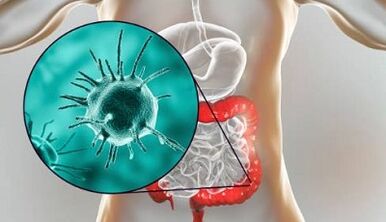
Parasitic diseases are a large group of diseases caused by helmink, some arthropods and protozoa.
According to statistics, despite all the results of modern medicine and advanced hygiene, people from all over the world have approx.90% live in their lives at least once.How to suspect a disease and what tests should be done on parasites.
Types of parasites
Parasites are organizations that survive the vital activity of organisms.During their installation and reproduction in the human body, they lead to a lack of micronutrients, vitamins, proteins and other nutrients.Both can lead to a decline and aggravation of chronic pathologies and damage the internal organs in itself.
There are the following types of parasites that can cause illness in people:
- protozoa (amoba, lamblia);
- pathogenic microorganisms (chlamydia, mycoplasma and others);
- Helmints (roundworms, pinworms, cattle and pork -stb);
- Parasite arthropods (Scabies Ath, Demodex).
The main feature of the pathologies they cause is a long asymptomatic or low symptomatic path.The parasites skillfully hide their existence and try to displace everything out of the host's body until the reserves are exhausted and the organ or fabric is severely damaged.
Symptoms of parasitic diseases
Parasitic pathologies are most often the diseases caused by the presence of Helmintsia.In most cases, they occur in children and can develop in adults if the hygiene rules are neglected.After the infection, they are not manifested in any way for a long time, or are accompanied by fine symptoms that often remain unnoticed.

All diseases are characterized by certain characteristics, but there are common symptoms:
- Headache, dizziness, increased weakness and fatigue.These manifestations are the consequences of intoxication that are derived from intoxication with the waste products of the parasites.
- The aggravation of bronchial asthma and allergic rhinitis, dermatitis, urticaria.These arise due to increased sensitivity and excretion products against helmin cells.
- Gastrointestinal disorders (abdominal pain, nausea, vomiting, heartburn, constipation and diarrhea).In the intestinal lumen parasitizing helmints lead to inflammation and intestinal obstruction due to intestinal lumen obstruction.
- Anemia, vitamin deficiency, weight loss.It is due to the lack of protein, vitamins and micronutrients, reduced hormones production.
- Sleep disorder, chronic fatigue, irritability, nervousness, muscles and joint pain.
To detect most helmin types, stool tests must be performed or donated to the presence of specific antibodies.You can take the test when you enter a clinic, your place of residence, to the hospital and any of the private laboratories.Some medical centers offer extensive examination to diagnose the presence or absence of a variety of parasites in the body.
Parasite tests

What tests should be performed on suspicion of a parasitic disease, the doctor will show you based on complaints, history and clinical manifestations.
The diagnosis begins with a general blood test.The most typical changes in helminthiasis are as follows:
- Reducing hemoglobin levels and reducing red blood cells (due to protein and iron deficiency).
- Increasing the number of leukocytes and acceleration of the ESR (signs of inflammation of the internal organs, especially the gastrointestinal tract).
- The growth of eosinophils (a characteristic sign of allergy, which is responded to Helmin's irritating effects).
For more accurate diagnosis, stool analysis is used on helmin eggs and scraping.Stool testing may detect pathogens of enterobiosis, ascariasis, hymenolidosis, and detect the presence of simple microorganisms (giardia).
It is important to note that in a single study, the likelihood of detecting worm eggs in stool is 30%.Therefore, in order to clarify the diagnosis, the first negative result is performed twice more, at intervals of 2-4 days.
In order to increase the accuracy of the study, it is important to carefully prepare for the stool to analyze.The biological material should only be collected in a special sterile container that can be purchased at the pharmacy.A few days before the analysis, you should deny the painting of foods (beets, red berries, exotic fruits, sweets and drinks with paints), and no laxatives and rectums are used.
Enzyme immunoassay
Using ELISA analysis, antibodies produced by the human body can be detected in adults and children as a response to the presence of foreign objects.To do this, blood is taken from a vein in which the laboratory can be detected in the laboratory, trichomonas, pork and cattle tape, Trichinella, echinococcus, toxocara, ascaris and Pinworms specific IgG antibodies.Using this study, you can detect almost all parasites in the human body.
Preparing for the study is not difficult.The test should be done in the morning with an empty stomach after an 8-10 hour fast.On the eve of the study, it is advisable not to take antibacterial and antihistamine drugs and eat allergenic foods (honey, seafood, exotic fruits and red berries, nuts).Immediately before the blood donation, experts recommend that they rest in the laboratory waiting room for 10-15 minutes.
The results of the study became known after 1-2 days.These tests are performed as a primary diagnosis and as control of treatment.
Timely recognition of parasitic diseases and modern effective treatment allow you to avoid hazardous complications.



























